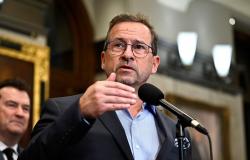
In rue Richard Vandevelde in Schaerbeek, a small white car with a strange look seems to be wandering without any real purpose. The vehicle, topped with strange devices placed on the roof, rushes into rue Detienne then that of Foyer Schaerbeekois before heading towards Chaussée de Helmet. A detour which is however in no way a GPS error: the driver of the car is in reality following a very precise route, one which will allow him to sift through all the streets of the neighborhood. Objective: scan all the license plates of vehicles parked on the road in the final hope of finding those whose drivers have not paid for their parking… or have exceeded the authorized time limit.
Brussels: paid parking brought in nearly 25 million euros to municipalities in 2022
In Belgium, more and more municipalities are using these famous scan-cars, the profitability of which is no longer in doubt and makes it possible to allocate staff previously dedicated to parking control to other tasks while increasing the financial jackpot. . In Brussels for example, parking profits increased from 22.72 million euros in 2021 to 24.95 million euros the following year for the 10 municipalities (there are now 12) which have entrusted parking management municipal at the parking.brussels agency.
Brussels is not the only one to entrust its management to third-party companies. Some Flemish and Walloon municipalities also use it. In Wavre, for example, the company managing parking in the city center made it possible to recover 1.2 million euros in 2023. And in Liège, €12.2 million in revenue was collected.
Touring: “100% of revenues generated must be reinvested in mobility infrastructure”
What do we do with all this money? In many municipalities, this financial windfall is then allocated, via a “common pot” system, to budgetary items that have nothing to do with road infrastructure: schools, cultural and sports policy, the environment. …
Paid parking? La Louvière has removed it, Waterloo does not even want to hear about it: “We are banking on a free and dynamic city center”
However, many motorists would consider it “fair” that the money recovered from parking be entirely dedicated to the maintenance and improvement of road infrastructure. Yesterday, 92% of respondents to our survey considered this necessary. “Like the circulation and registration tax, they were dedicated to roads and highways,” indicates Michel Bockourt. Since then, it has gone into a common pot, a federal budget from which each minister draws to carry out his “projects” to improve Belgium , but in practice this is not the case.”
Albert Petit, for his part, is laconic: “Quae Sunt Caesaris, Caesaris.” We must render to Caesar what is Caesar’s. To motorists, what comes from motorists.
In any case, this is the firm position of Touring, the ardent defender of motorists. “We believe it is imperative that 100% of the revenue generated by parking fees and fines be reinvested in mobility infrastructure,” comments Lorenzo Stefani, spokesperson for Touring. Every year, millions of euros are collected through parking fees and fines in different municipalities. These funds have the potential to significantly transform urban mobility if allocated effectively.”
For Touring, which wants the same to apply to road tax, road tax and road fines, these funds should contribute to the overall improvement of transport conditions for all road users. “Improving roads as a first step because better road maintenance and development can reduce congestion, improve safety and increase user satisfaction. Then in the development of sustainable mobility solutions: investing in infrastructure for electric vehicles (Editor’s note: charging stations, among others), bicycles (Editor’s note: protected cycle paths) and public transport can encourage greener modes of transport.
According to Touring, reinvesting these funds directly into mobility ensures that those who pay fees and fines see the benefits of their contributions. “We encourage municipalities to ensure that every euro collected is reinvested in projects that concretely improve mobility for all. This would be a significant step towards more sustainable and liveable cities.”
Liège: “We invest 4.5 times the amount of revenue in mobility”
We haven’t had many responses from them. Only Christine Defraigne, Alderwoman of Finance in Liège, responded to us. And explains that, for 2024, no less than “54.4 million euros (Editor’s note: a large part of which comes from subsidies have been budgeted to improve infrastructure.” In the repair of the roads of the Ardent City but also in soft mobility infrastructure such as the creation of bicycle corridors or the repair of sidewalks “Liège is under a management plan and depends on a circular which makes it impossible to directly allocate financial income linked to parking to mobility,” comments the elected official. Liège everything is put back into a sort of common pot from which the budgets are drawn. But concretely, we can say that Liège invests 4 times more money in mobility than what it receives in parking revenue.
In Waterloo, we’re banking on free parking
On the outskirts of Brussels, Waterloo is one of those municipalities which still resists the tempting jackpot of paid parking. In total, the Lion City has 15,000 parking spaces accessible free of charge. Including nearly 2,000 in the city center. And there was never any consideration of switching to paid parking. “Our philosophy is simple: our goal is to support local commerce,” confides Mayor Florence Reuter. The collaboration between the municipality and the businesses is excellent and we have a very high occupancy rate of commercial space and it continues to increase. This is due to a range of factors and free parking is a big one. We come from Brussels, from Flemish Brabant, from all over Walloon Brabant to come and do our shopping in Waterloo. Our town has become a center of attractiveness. ”
If Waterloo is thus giving up on hundreds of thousands of euros in parking revenue, it is also out of… financial concern. Waterloo in fact prefers to have a “free but dynamic” city center than a “paid but moribund” city center. And largely recovers the shortfall through tax revenue from businesses. “Visitors, traders, the community,… everyone is a winner,” concludes Florence Reuter.





